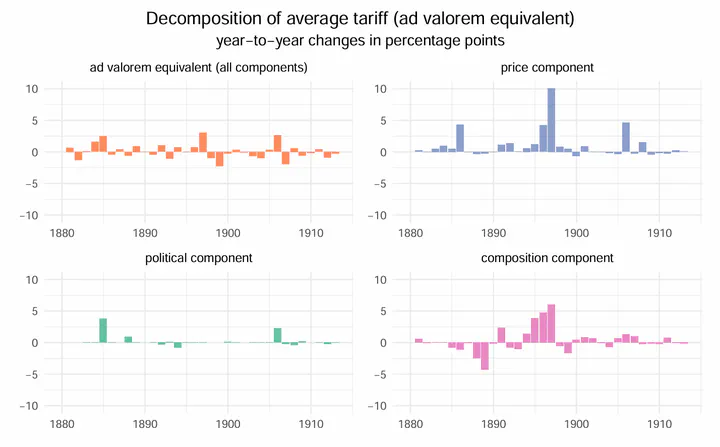How to solve the tariff-growth paradox? Do higher tariffs relate to higher growth in the first globalization?
Mar 10, 2025·
 ·
1 min read
·
1 min read
Sebastian Geschonke

Abstract
No, higher tariffs do not relate to higher growth in the first globalization. However, the more intriguing answer in this paper is that neither a positive nor a negative relation of tariffs to growth can be interpreted without understanding the origins of changes in the ad valorem equivalent tariff: political, price, and composition changes. This decomposition helps to explain the tariff-growth paradox, a finding that while post-WWII, more trade and growth correlate with lower tariffs, before WWI, researchers find higher tariffs correlating with growth. Nevertheless, the new methodlogy to decompose ad valorem equivalent tariffs is relevant to research using 20th century tariffs as along as there are specific tariffs (price component) and changes in the import composition (composition component). In the first globalization before WWI, specific (per-unit) tariffs were more prominent, and so was the influence of prices on average tariffs. While researchers so far have controlled for the influence of price changes on an aggregate level, I control for price fluctuations at the product level with a newly developed methodology. The analysis uses new micro data on tariffs and trade that is uniquely detailed for this period and harmonized at the product level. The tariff variation comes from general tariff reforms and country-specific trade treaties. The dataset covers the full tariff and trade universe of the German Empire between 1880 and 1913, with more than four million observations. I decompose ad valorem equivalent tariffs into politically set and market-driven components. Market factors - shifts in price and import composition - account for 90% of changes in the average tariff. The policy tool of politically set tariff changes accounts for just 10%. Contrary to previous studies linking tariffs to growth, I show that this correlation arises from price changes, not political decisions on tariff policy. The decomposition helps to explain how growth in industrial productivity does not benefit from industrial tariff policy but from the substitution of products and cheaper inputs to production.
Type
Podcast of article (12min)
Using Google Notebook LM, I created a podcast presenting my article. You can get an excellent first impression of my idea and results from it.
Please listen: